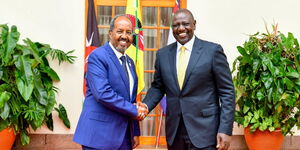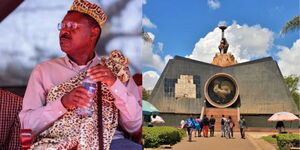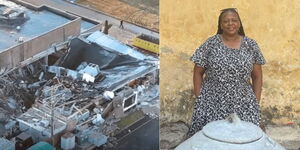Facing a public pinch from soaring cooking gas prices, the government has announced plans to collaborate with its East African neighbours on bulk imports of liquefied petroleum gas (LPG).
According to Davis Chirchir, the Cabinet Secretary overseeing Energy and Petroleum, Kenya aims to increase the adoption of clean cooking methods, aligning with the Nairobi Declaration's objectives of promoting just energy transitions and gender equality, particularly for rural African women, youth, and children.
Speaking during the inaugural high-level Clean Cooking Summit in Paris on Tuesday, Chirchir highlighted Kenya's strategy. "We want to leverage the strategic location of the Port of Mombasa to facilitate the importation of significant gas volumes for Kenya, Uganda, and Rwanda, benefiting from economies of scale with larger vessels," he stated.
Kenya currently grapples with the soaring costs of clean cooking solutions like Liquefied Petroleum Gas (LPG). Chirchir noted poverty as a significant challenge, emphasizing the need to address the affordability of clean cooking facilities.
Recent data from the Kenya National Bureau of Statistics reveals a surge in LPG prices, with the average cost of refilling a 13kg cylinder rising to KSh 3,231.84 in March, up from KSh 3,187.10 in February.
The Energy Minister attributed the price hikes to entry costs, citing the $20 expense for a gas cylinder as a barrier hindering access to clean cooking solutions.
Kenya's urgency in expanding clean cooking access stems from stark statistics: only 30% of rural households and 54% of urban households currently use clean cooking technologies. The low awareness levels exacerbate the situation.
A report by Modern Energy Cooking Services underscores the health risks posed by traditional cooking fuels, such as wood stoves and charcoal, which result in over 21,500 annual deaths in Kenya. Despite efforts to promote alternatives like LPG, market penetration remains low due to affordability challenges.
Chirchir outlined Kenya's plan to reinvest carbon credit earnings into reducing LPG costs, underscoring the commitment to achieving Sustainable Development Goal 7.
The Clean Cooking Summit affirmed universal clean cooking access as a priority, securing $2.2 billion from the International Energy Agency to bolster financing, policies, and partnerships in the sector.
Co-chaired by President Samia Suluhu Hassan, alongside leaders from the African Development Bank, Norway, and the IEA, the summit signifies a collective commitment to addressing the clean cooking challenge, crucial for the health and well-being of African communities.












